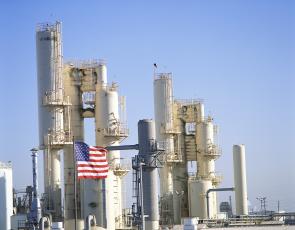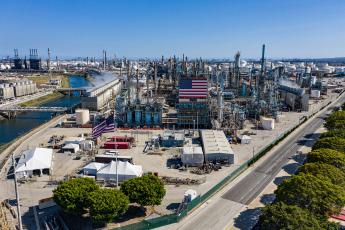The American Fuel & Petrochemical Manufacturers (AFPM) has expressed concern about the impact that steel and aluminum tariffs would have on prices at the pump, infrastructure investment and jobs. Measures limiting the free flow of energy trade lead to inefficiencies in the market, which negatively impacts consumers, businesses and the economy. These concerns are shared by a wide array of economic experts, top-tier media and a bipartisan group of policymakers. Here’s what they’re saying: Policymakers & Government Officials
“Countries that have remained open to trade, that haven’t erected barriers including tariffs, have grown faster. They’ve had higher incomes, higher productivity. Countries that have gone in a more protectionist direction have done worse.” – Jerome Powell, chairman, Federal Reserve, 7/17/18
“I disagree with the decision [to implement tariffs]. There are better ways to help American workers and consumers.” – Paul Ryan (R-Wis.), Speaker of the House, 5/31/18
“There’s lots of concern that the increased cost in pipe will increase the costs for our oil. You pull on one string in international trade and it unravels in ways you could not have predicted.” – Heidi Heitkamp (D-N.D.), 6/19/18
“Action is needed to address the worldwide overcapacity of steel, but I believe we should take a more targeted approach. We should focus on countries that distort markets and repeatedly violate trade laws, and on the steel and aluminum products that are most at risk from a national security perspective. I am concerned that broad-based tariffs will have unintended consequences for downstream steel and aluminum users and will unnecessarily invite retaliation in the form of tariffs against U.S. exports.” – Rob Portman (R-Ohio), 3/8/18
“Tariffs on steel and aluminum imports are a tax hike on Americans and will have damaging consequences for consumers, manufacturers and workers.” – Orrin Hatch (R-Utah), chairman, Senate Finance Committee, 5/31/18
“This action puts American workers and families at risk, whose jobs depend on fairly traded products from these important trading partners. And it hurts our efforts to create good-paying US jobs by selling more 'Made in America' products to customers in these countries.” – Kevin Brady (R-Texas), chairman, House Ways and Means Committee, 5/31/18
Top-Tier Media
“Tariffs create all sorts of inefficiencies, unintended consequences and uncertainty, none of which is good for an interdependent global economy.” – Editorial Board, Washington Post, 7/5/18
“How will [tariffs] affect the U.S. economy? Exporters will be hurt, of course — and exports support around 10 million jobs. Some industries that compete with imports might end up adding jobs. But they wouldn’t be the same jobs, in the same places: A trade war would cause huge worker displacement.” – Paul Krugman, columnist, The New York Times, 7/2/18
“Studies illustrate what economists have long argued, that, in today’s global economy, protectionism is probably self-defeating. That’s not simply because other countries will retaliate with their own tariffs against our products — as Europe, Canada and Mexico have already promised they will do — but because the tariffs hurt more workers than they help. Protectionism saves yesterday’s jobs at the cost of tomorrow’s.” – David Ignatius, columnist, Washington Post, 6/5/18
“This tax increase [of tariffs] will punish American workers, invite retaliation that will harm U.S. exports, divide his political coalition at home, anger allies abroad, and undermine his tax and regulatory reforms.” – Editorial board, The Wall Street Journal, 3/1/18
“Only two barriers stand in the way of Texas’ continued growth: a labor shortage and President Trump’s tariffs on imported steel. The energy industry needs steel as it sets new records for oil and gas production. It needs pipe to drill wells in the Permian Basin and Eagle Ford Shale and pipe to carry the crude oil, natural gas and products to Gulf Coast markets. Trump’s tariffs on imported steel put this productive piece of the American energy renaissance in limbo.” – Chris Tomlinson, energy reporter & columnist, Houston Chronicle, 7/23/18
Economic Experts
“The president thinks gasoline prices are too high and is pushing OPEC to increase crude oil production so that gasoline prices will fall. Good, but imposing steel tariffs will have just the opposite effect, forcing consumers to pay more for electricity and to fill their tanks.” – Merrill Matthew, resident scholar, Institute for Policy Innovation, 6/20/18
“Economists have also long understood that barriers to trade, while pitched as a way to help domestic workers, always heavily penalize domestic consumers […] The same is true of Mr. Trump’s steel tariffs. Claiming that they protect a vital industry and its 140,000 workers, tariff supporters never mention how much harder they make things for the 6.5 million manufacturing workers in steel-consuming industries. Add to that number all of us who consume goods made of steel, and you get an even larger figure.” – Vernique de Rugy, senior research fellow, Mercatus Center, 6/20/18
“Economists will carefully explain to all sides that higher tariffs harm domestic economies by generating investment-deterring uncertainty, raising prices for consumers, and undermining overall efficiency (as producers are insulated from global competition and face higher input prices).” – Ryan Bourne, chair for the public understanding of economics, Cato Institute, 6/12/18
“The current approach — and the obvious retaliation that will occur in response — poses a serious risk of raising barriers and reducing Americans’ access to vital global markets. Our businesses will lose customers, workers will lose jobs, and American consumers will lose family income through higher taxes and higher prices.” – Tom Donahue, CEO, U.S. Chamber of Commerce, 6/1/18
“An escalating trade war could undermine the Trump administration’s exports-based conception of ‘energy dominance’ by limiting U.S. producers’ access to overseas markets.” – Kevin Book, senior associate, CSIS, 3/20/18
“These proposed tariffs are unlikely to achieve their intended goals of pressuring trade partners suspected of creating market distortions from subsidies and dumping. Instead, they are increasing uncertainty over the coherence of America’s trade strategy and antagonizing its trade partners.” – Max Bouchet, senior research assistant, Brookings Institution, 3/6/18
“The end result of increased tariffs will be a combination of qualified workers not getting hired, other workers losing their jobs, and families paying higher prices.” – Tori Whiting, trade economist, The Heritage Foundation, 7/2/18

